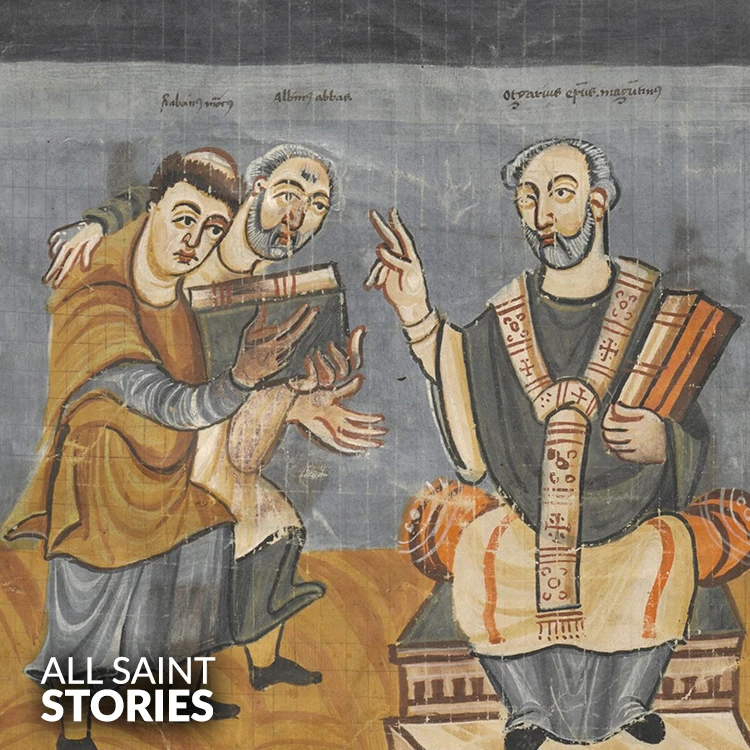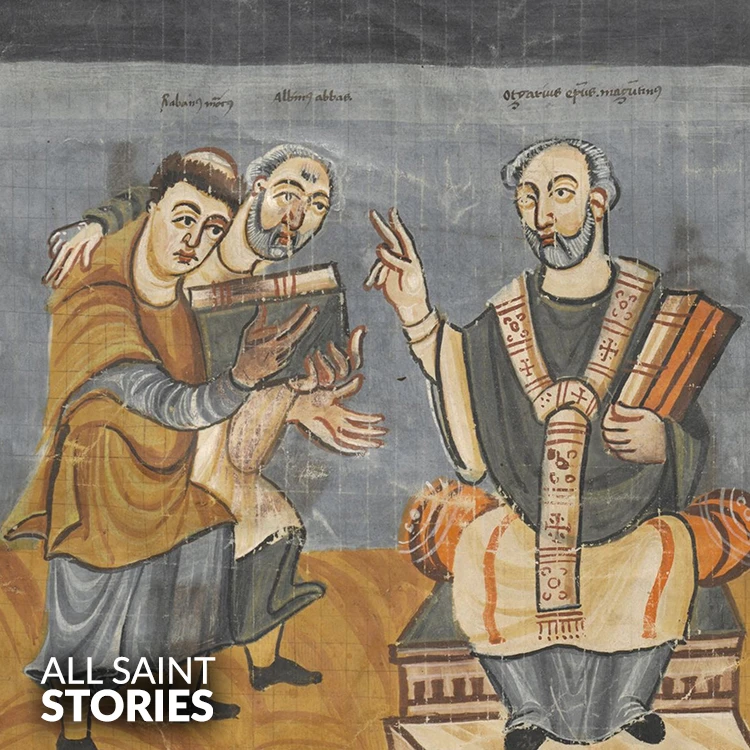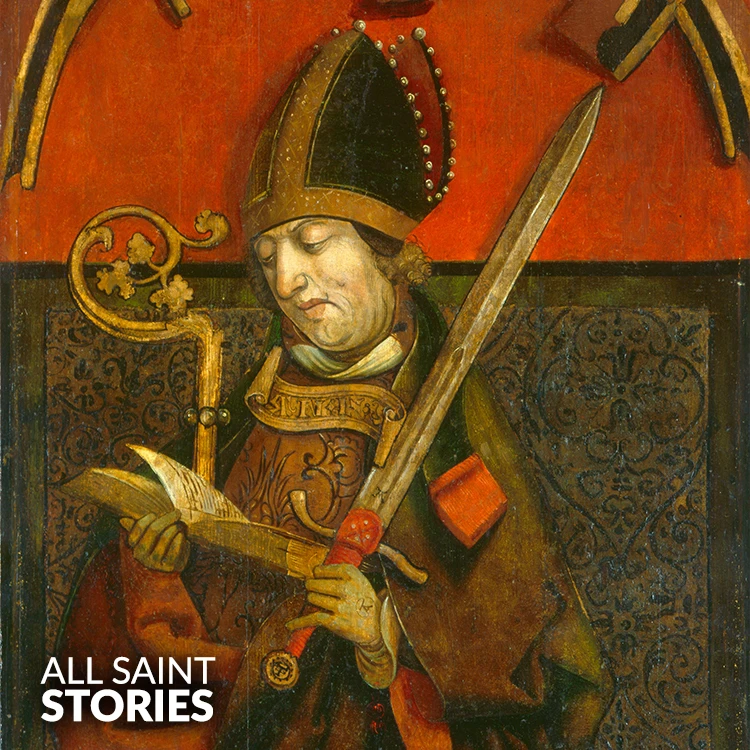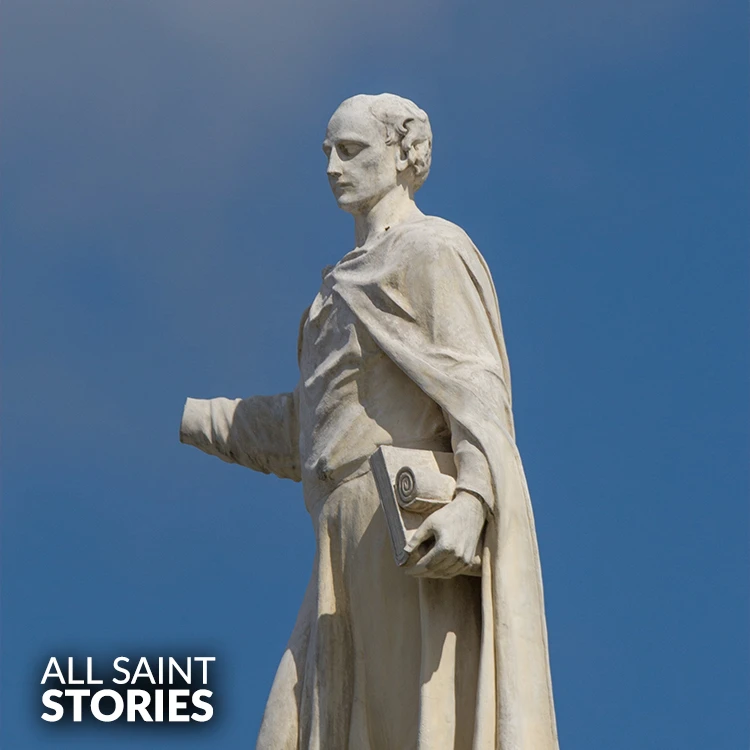St. Alcuin, Teacher, scholar, and servant of God, Pray for us to seek wisdom and knowledge with humility. Help us to use our gifts for the service of God and others, And to live lives of holiness, dedication, and love. Amen.
ST. ALCUIN OF YORK
ST. ALCUIN OF YORK

Saint Alcuin of York was an Anglo-Saxon scholar and theologian who played a crucial role in the Carolingian Renaissance. Born in 735 in Northumbria, he became an adviser to Charlemagne, reforming education and monastic life. He died in 804 in Tours, France.
Alcuin of York, born around 735 in the Anglo-Saxon kingdom of Northumbria, emerged as one of the most influential scholars and educators of the early Middle Ages. Educated at the renowned cathedral school in York under Archbishop Ecgbert, a disciple of the Venerable Bede, Alcuin was immersed in classical and Christian learning from an early age. His scholarly excellence earned him a leadership role at the school, which under his guidance, flourished as a center of learning in theology, liberal arts, and sciences.
In 781, during a visit to Italy, Alcuin encountered the Frankish King Charlemagne. Recognizing Alcuin’s intellectual gifts, Charlemagne invited him to join his court in Aachen, where Alcuin would become a central figure in what would later be termed the Carolingian Renaissance—a revival of classical knowledge, arts, and learning across Europe. As head of the palace school, Alcuin served not just as a teacher but as a mentor to Charlemagne himself and to his court. He helped to standardize curriculum across monasteries and cathedral schools, promoting the seven liberal arts—grammar, rhetoric, logic, arithmetic, geometry, music, and astronomy—alongside theological study.
Alcuin's influence extended far beyond education. He was instrumental in reforming the Frankish Church, encouraging discipline, morality, and scholarship among clergy. He also led the production and correction of biblical and liturgical texts to ensure their accuracy and consistency. His efforts were crucial in preserving many classical Latin texts which might otherwise have been lost.
In 796, Alcuin retired from court life and took on the role of abbot at the Abbey of Saint Martin in Tours. There, he continued his scholarly pursuits, writing numerous letters, poems, and theological treatises. Among his lasting contributions was his role in developing and promoting the Carolingian minuscule—a clear and legible script that influenced modern European writing styles and became the precursor of contemporary Roman typefaces.
Alcuin died on May 19, 804, and was buried at the abbey in Tours. Though never officially canonized by the Roman Catholic Church, he is venerated as a saint in the Church of England, the Episcopal Church (USA), and the Orthodox Church in the British Isles and Ireland. His feast is typically celebrated on May 20.
His legacy lives on not only through his writings and reforms but through institutions that bear his name, such as Alcuin College at the University of York. A champion of Christian humanism, Alcuin's work laid the foundation for educational and ecclesiastical reforms that shaped medieval Europe and influenced Western
Video Not Found
The information on this website is compiled from various trusted sources. While we aim for accuracy, some details may be incomplete or contain discrepancies.
If you notice any errors or have additional information about this saint, please use the form on the left to share your suggestions. Your input helps us improve and maintain reliable content for everyone.
All submissions are reviewed carefully, and your personal details will remain confidential. Thank you for contributing to the accuracy and value of this resource.
Credits & Acknowledgments
- Anudina Visudhar (Malayalam) – Life of Saints for Everyday
by Msgr. Thomas Moothedan, M.A., D.D. - Saint Companions for Each Day
by A. J. M. Mausolfe & J. K. Mausolfe - US Catholic (Faith in Real Life) – Informational articles
- Wikipedia – General reference content and images
- Anastpaul.com – Saint images and reflections
- Pravachaka Sabdam (Malayalam) – Saint-related content and insights
We sincerely thank these authors and platforms for their valuable contributions. If we have unintentionally missed any attribution, please notify us, and we will make the correction promptly.
If you have any suggestion about ST. ALCUIN OF YORK
Your suggestion will help improve the information about this saint. Your details will not be disclosed anywhere.
© 2026 Copyright @ www.allsaintstories.com





 English
English
 Italian
Italian
 French
French
 Spanish
Spanish
 Malayalam
Malayalam
 Russian
Russian
 Korean
Korean
 Sinhala
Sinhala
 Japanese
Japanese
 Arabic
Arabic
 Portuguese
Portuguese
 Bantu
Bantu
 Greek
Greek
 German
German
 Dutch
Dutch
 Filipino
Filipino